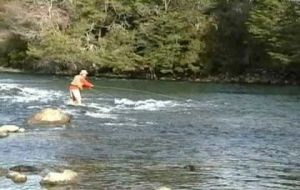MercoPress. South Atlantic News Agency
Invasive algae found in Chilean Patagonia threatens ecosystem and tourism
 Fly fishing is one of the many attractions of Patagonia
Fly fishing is one of the many attractions of Patagonia In February, Chris Spelius, owner of the adventure travel company Expediciones Chile, was standing out by the Futaleufu River in Southern Chile waiting for a client, when he looked into the normally clear water and noticed something unusual.
“I saw what looked like ground-up toilet paper in the water,” Spelius recalled to the Santiago Times this week. “I have been here for 24 years and I knew I had never seen this before.”
Initially Spelius attributed the object to the newly built sewage treatment plant upstream, but after a faecal microbe test initiated by the local government turned up negative, that explanation seemed unlikely.
Finally a trip upriver from the plant debunked the idea all together. Chemical analyses done by a variety of organizations finally concluded that what Spelius saw in the water was not waste, but rather an invasive biological species.
Didymosphenia, commonly known as “Didymo,” “Rock Snot” or “The Toliet Paper Weed,” has been discovered in New Zealand and North America and is now confirmed to have made its way into the Futaleufu River, in Chile’s Patagonia Region.
According to Bill Horvath, the chemist who first began researching the appearance of the algae, Didymo is usually brought over from other parts of the world through tourists who carry it in their rafting, kayaking or fishing gear. In 2007, the lack of regulations on this type of tourist activity prompted the United States’ Environmental Protection Agency to issue a warning to the Chile government regarding possible infestation if measures were not taken.
“The desire for people to travel down here is not going to change,” said Horvath, “but the mode in which they travel needs to change. This may just mean people not bringing their own gear to use.”
If left unregulated, the organism could have a devastating effect on the local ecosystems because it kills off bottom-dwelling insects that fish normally feed off of.
“Patagonia has a world-wide reputation for fly fishing,” Spelius said. “The potential damage is awful.”
In addition to the environmental damages, the potential economic costs to tourism and local businesses are huge. According to estimates from areas affected in New Zealand, the Didymo invasion will end up costing the region between US$57 million and US$285 million by the year 2011.
“Chile needs to respond nationally to this because it is not just a tourism blemish on Futaleufu, is a bigger issue,” said Horvath. “It has implications for hydropower and other industries as well. The costs just keep adding up.”
Despite the potential damage, Spelius and Horvath say Chile´s government has shown little concern about curbing the problem and has to this point not taken any action.
“We brought our concerns to the mayor and to the municipality,” said Horvath. “They seemed completely uninterested.”
Horvath is set to meet with members of the local government today, Tuesday, to discuss the issue, but is unsure what will result from it. He is hoping to begin discussing possible regulations, such as border controls, that could help prevent the spread of the algae to other parts of the region.
If done correctly, rather than hurting the tourism industry, new regulations could open up new opportunities for rental businesses and other new business models, Horvath explained. But, with regulation, the most important thing is still preserving the Patagonian wilderness.
“This place has been sort of overrun by civilization,” said Horvath. “If you really want to preserve this, then you need to regulate it. Looking at the world and the population there isn’t going to be many pristine areas left if we just expand willy-nilly. We need to get our act together because it will be Disney Land here before you know it.”
By Lindsay Fendt – Santiago Times




Top Comments
Disclaimer & comment rules-

Read all commentsThanks for sharing. I learnt a lot from your site. I would also like to share some very useful information with you all about
Jun 04th, 2010 - 06:45 pm 0Best Tourism Info . Make sure you check it out.
Commenting for this story is now closed.
If you have a Facebook account, become a fan and comment on our Facebook Page!